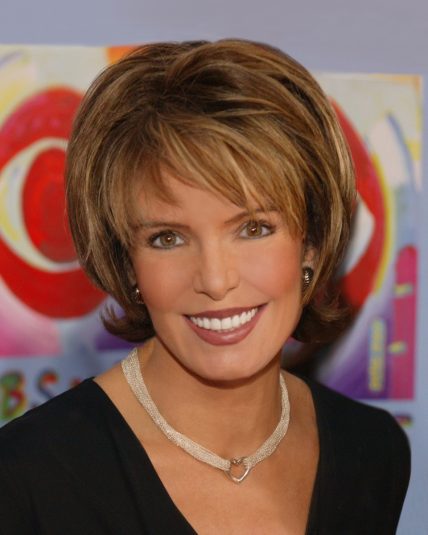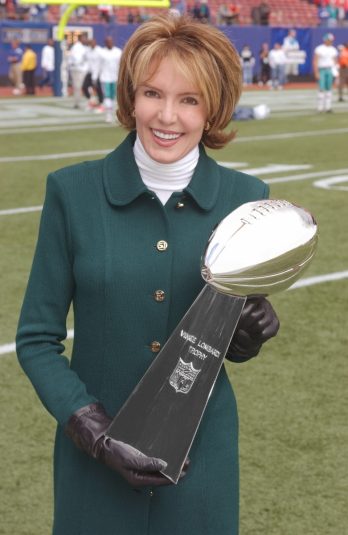Sports Broadcasting Hall of Fame: Lesley Visser, Sportscasting Trailblazer
Story Highlights
SVG is profiling this year’s 10 Sports Broadcasting Hall of Fame inductees in the weeks leading up to the ceremony on Dec. 12 at the New York Hilton. For more information, visit sportsbroadcastinghalloffame.org.
With so many “firsts” attributed to Lesley Visser throughout her storied career in sports broadcasting, it’s fair to say that she didn’t just blaze the trail for female sportscasters: she created it.
When Visser was growing up in the 1960s, she says, “women were only three things: they were teachers, nurses, or homemakers. So, when I said I wanted to be a sportswriter, it was like saying, I want to go to the moon.”
But Visser, through a combination of talent, perseverance, and a great deal of humor, accomplished her goal of becoming a sportswriter. Indeed, she would go on to become the most highly acclaimed female sportscaster of all time, the first and only woman inducted into the Pro Football Hall of Fame, and the first sportscaster — male or female — to work on network broadcasts of the Super Bowl, World Series, NBA Finals, Triple Crown, Olympic Games, U.S. Open golf, and World Figure Skating Championship.
“To be the first in anything is an accomplishment,” says CBS Sports Chairman and Sports Broadcasting Hall of Famer Sean McManus. “Lesley’s career has been full of firsts as a pioneer in sports broadcasting. Her induction into the Sports Broadcasting Hall of Fame is a testament to a career of being that pioneer for both women and men in sports broadcasting.”
Boston Beginnings
Born in 1953 in Quincy, MA, Visser moved frequently throughout her childhood, due to her father’s job as a scientific engineer, but she never lost her passion for Boston sports. Learning to score a baseball game with her older brother in the stands at Fenway Park, rooting for her beloved Celtics as they clinched championship after championship — Visser’s love for her hometown teams carried her through multiple moves and helped her realize what she wanted to be when she grew up.
Although there were no female sportscasters at the time, Visser’s mother, a teacher, supported her precocious daughter’s dream. “She said to me, ‘Sometimes you have to cross when it says, Don’t walk.’ It was liberating,” Visser recalls. “It was permission for me to pursue a dream.”
She attended Boston College, where she majored in English and wrote for the sports staff of the school’s paper. Her big break in the industry would come in 1974, when she applied for a Carnegie Foundation grant — which was established to enable 20 American women to begin careers in industries that, at the time, were 95% male — and won. As a result, she joined the sports staff of the Boston Globe, where she would work for the next 14 years.
Unlike her tenure at the Boston College newspaper, during which she predominantly covered the university’s less popular sports, her career at the Boston Globe quickly took off when she was assigned to cover the New England Patriots, becoming the first-ever female beat reporter for an NFL franchise. The job came with its fair share of challenges, ranging from the physical (women weren’t allowed in NFL locker rooms until the early 1980s, making interviewing players particularly difficult) to the sociological, but Visser responded to each crude comment she received with a witty retort and, to prove her critics wrong, diligently studied the sport of football.
“I tried to understand that it was new for [the players], too: a woman covering football,” she explains. “The Boston Globe gave me great support. When I started, [famed Globe sportswriter] Will McDonough went to the Patriots and said, Look, we’re going to have a woman cover us, and that’s that. So I had great support.”
From Print to Primetime
In 1983, after more than a decade writing for the Boston Globe, Visser began to split her time with CBS Sports. And, although sportswriting would always be her first love, she transitioned to television full-time in 1987.
During her first stint at CBS Sports, which would last until the network lost its NFL rights following the 1993 season, Visser covered a wide variety of sports, including the NBA, MLB, college basketball, and college football. She joined Greg Gumbel, Terry Bradshaw, and Pat O’Brien on CBS Sports’ The NFL Today in 1990 and, two years later, became the first — and only — woman to handle the Lombardi Trophy during the Super Bowl presentation.
Visser then transitioned to ABC Sports for nearly seven years, extending her string of notable “firsts”: she became the first woman assigned to Monday Night Football and also to report from the sidelines during a Super Bowl. She also served as a reporter for ABC Sports’ NFL playoff games, college-football bowl games, Triple Crown horseracing, and more.
In 2000, Visser returned to CBS Sports and The NFL Today and played an integral role in The Eye’s Super Bowl XXXV, XXXVIII, XLI, and XLIV broadcasts. Beginning in 2004, she teamed up with Jim Nantz and Phil Simms, becoming lead reporter on CBS Sports’ No. 1 NFL announce team. That same year, she was honored to carry the Olympic Torch, the first female sportscaster to do so.
“The broadcasting industry is blessed to have a pioneer like Lesley,” says CBS Corp. Chairman/CEO Leslie Moonves. “Through 40 remarkable years of covering sports, including her terrific tenure as an NFL and NBA reporter for CBS, she has blazed a trail for women that will last forever. I congratulate her on this very well-deserved induction.”
For more than 40 years, Visser has forged her own path in sports broadcasting — a path for which many aspiring female sportscasters are surely grateful — but, for Visser, it isn’t the praise and recognition or the idea of being a pioneer that keeps her moving forward. It’s her love of sports.
“For me, it was never about the fame or the money,” she says. “I like the games. I like the competition. I always say that the great thing about sports is, it’s not scripted. It doesn’t matter where your mother went to college or if your father’s really wealthy. Either you hit the jumper or you don’t. You sink the putt or you don’t. I think it’s a great meritocracy.”


